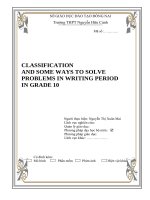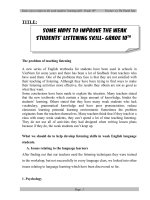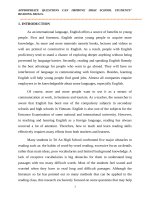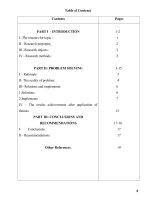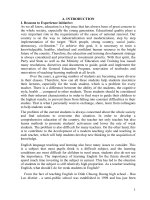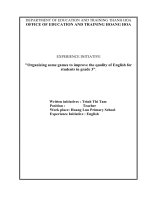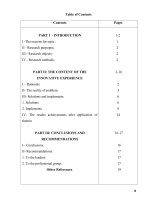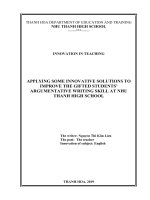skkn some ways to improve the weak students’ listening skill grade 10th
Bạn đang xem bản rút gọn của tài liệu. Xem và tải ngay bản đầy đủ của tài liệu tại đây (322.74 KB, 15 trang )
Some ways to improve the weak students’ listening skill - Grade 10 th
Teacher :Ly Thi Thanh Tam
TITLE:
SOME
SOMEWAYS
WAYSTO
TOIMPROVE
IMPROVETHE
THEWEAK
WEAK
TH
STUDENTS’
STUDENTS’LISTENING
LISTENINGSKILLSKILL-GRADE
GRADE10
10TH
The problem of teaching listening
A new series of English textbooks for students have been used in schools in
VietNam for some years and there has been a lot of feedback from teachers who
have used them. One of the problems they face is that they are not satisfied with
their teaching of listening. Although they have been trying to find ways to make
their listening activities more effective, the results they obtain are not as good as
what they want.
Some conclusions have been made to explain the situation. Many teachers stated
that the new textbooks which contain a large amount of knowledge, hinder the
students’ learning. Others stated that they have many weak students who lack
vocabulary, grammatical knowledge and have poor pronunciation, reduce
classroom learning potential learning environment. Sometimes the problem
originates from the teachers themselves. Many teachers think that if they teach in a
class with many weak students, they can’t spend a lot of time teaching listening.
They do not use all of activities they had designed when writing lesson plans
because if they do, the weak students can’t keep up.
What we should do to help develop listening skills in weak English language
students.
A. Issues relating to the language learners
After finding out that our teachers used the listening techniques they were trained
in the workshop, but not successfully in every language class, we looked into other
issues relating to language learning which have been discovered so far.
1. Psychology
Page 1
Some ways to improve the weak students’ listening skill - Grade 10 th
Teacher :Ly Thi Thanh Tam
We should take into account the psychology of learning habits and skills. Certain
psychological factors should be considered such as memory. We should consider
their mental condition, their ability.
2. Motivation and learning
- Students learn well if they are well-motivated. We can motivate even
unmotivated students.
3. Learning styles
- Visual learners learn through seeing.
- Auditory learners learn through listening.
- Tactile/Kinaesthetic learners learn through moving, doing and touching.
4. Types of Multiple Intelligence
- Visual/Spatial Intelligence: ability to perceive the visual.
- Verbal/Linguistic Intelligence: ability to use words and language.
- Logical/Mathematical Intelligence: ability to use reason, logic and numbers.
- Bodily/Kinaesthetic Intelligence: ability to control body movements and handle
objects skilfully.
- Musical/Rhythmic Intelligence: ability to produce and appreciate music.
- Interpersonal Intelligence: ability to relate and understand others.
- Intrapersonal Intelligence: ability to self-reflect and be aware of one’s inner state
of being.
It is believed that each person has at least 3 or 4 types of intelligence. So we
cannot think that weak learners are unintelligent people.
5. Weak students
Weak students are the students who usually lack basic knowledge or skills, have
difficulty in comprehension. Some teachers say that in the classroom the weak
students often lack concentration. They are easily confused so in the classroom the
teacher should give clear, step by step, instructions. The teacher should anticipate
that weak students may need extra help, extra explanations.
Page 2
Some ways to improve the weak students’ listening skill - Grade 10 th
Teacher :Ly Thi Thanh Tam
B. What we do to help weak students in Listening.
1. At the pre-listening stage: have more time at the pre-listening stage by
shortening the post-listening stage.
At this stage, we carefully prepare the lesson reading the tapescripts and using The
Teaching Listening Checklist. The following activities can be used based on the
content of each lesson:
- Revise and teach vocabulary.
- Revise and teach grammatical structure.
- Create a gap-filling task or other tasks based on the tapescript.
- Train listening skills.
- Train microskills for listening.
- Give some listening tips.
2. At the while-listening stage:
- Remember to tell the aim of listening before you let the students listen to the tape.
- Write a very easy question so that the students can answer after the first listening.
(to encourage them to listen, to make them have a feeling of success).
- Write more additional questions to the listening tasks to make them easy for the
students.
- Ask the students to guess before they listen to the tape. (Do not say what they
guess is wrong or right, ask why they guess so if necessary).
- Be flexible when getting the students to listen to the tape. Read the listening text
if you find it helpful to your students.
- Instruct students how to make the answers while listening ( short answers or main
ideas)
SOLVE THE PROBLEM
- In the Tieng Anh 10 textbook in VietNam, activities in the three stages are ready
for the teachers to use. The problem is that many students are still weak at learning
English, particularly, listening. Sometimes they are fed up with listening activities
Page 3
Some ways to improve the weak students’ listening skill - Grade 10 th
Teacher :Ly Thi Thanh Tam
because they are forced to listen to stories or conversations from the cassette
players, and grasp nothing. Sometimes they feel happy in listening activities,
because they just pretend to do some activities the teacher asks them to do, pretend
to listen to the tape carefully, finish one or two tasks in the textbook and wait for
the answers to the tasks the teacher tell them or someone of their classmates who is
lucky to get the teacher’s book.
- So as to teach weak students effectively, I have designed some units of the 10 th
form textbook such as : Unit 1, unit 3, unit 6, unit 10 and unit 12
A. Unit 1: A DAY IN THE LIFE OF ….
I. Warm-up
- Students look at the pictures and answer the question.
What are their jobs?
Picture 1
Picture 2
Picture 3
Picture 4
Expected answers:
Picture 1: He is a taxi driver
Picture 2: He is a cyclo driver
Picture 3: He is a bus driver
Page 4
Some ways to improve the weak students’ listening skill - Grade 10 th
Teacher :Ly Thi Thanh Tam
Picture 4: He is a pilot
II. Pre- listening
1. Revise vocabulary: get up, old man, a lady, fellows, school pupils, take a short
rest. Use the pictures in the textbook to help the students to find out the
Vietnamese equivalence.
2. Help the students to find out the Vietnamese equivalence of other English words
given in the task: district, routine, office, pedal, purchase, drop, ride, park, food
stall, passenger.
Note: After the two above activities, students can obtain more words needed for
listening to do the task.
3. Ask the students to pay attention to some clues:
+ The time: five thirty, six, after, twelve.
+ The words: first passenger, next passenger, third passengers.
3.a. Ask the students to use the given words to complete the spaces in the
following sentences (The sentences are extracted from the listening text):
work
get up
park
food stall
ride off
a. I …… at five thirty in the morning.
b. At about ten thirty I ……. toward Nguyen Thi Minh Khai School.
c. I start ….. at six.
d. At twelve I have lunch at a …….. near Ben Thanh Market.
e. After lunch, I ……. my cyclo under a tree.
3.b. Tell the students that the above sentence belongs to a paragraph about the
daily routine of a cyclo driver, but they are not in their correct order. Ask the
students to put them. (You can use Vietnamese for the instruction if you find it
helpful and you want to save the time in case your students do not understand the
instruction in English).
4. Ask the students to put the following sentences in their correct order (The
sentences are extracted from the listening text):
a. My next passenger is a lady who does shopping there every two days.
Page 5
Some ways to improve the weak students’ listening skill - Grade 10 th
Teacher :Ly Thi Thanh Tam
b. My third passengers are two school pupils, a girl and a boy.
c. My first passenger is usually an old man.
Note: The activities 3.b and 4 serve to help the students to be familiar with the
ordering task.
5. Ask one student to mime what a cyclo driver does everyday.
Note: This activity will change the atmosphere in the classroom because it is funny
and it helps the tactile learners to show themselves. Activities 1, 2 is for visual
learners or students having verbal intelligence. Activities 3.b and 4 are for students
having logical intelligence.
III. While listening
- Ask the students to listen to the tape for the first time and answer the following
questions:
The listening text is about …… .
A. a cyclo driver
B. a bus driver
C. a taxi driver
- For the second or third, or fourth listening the teacher should help the students to
finish the listening task in the textbook.
IV. After listening
Ask students to retell the story to the class from the outline
a cyclo driver
Mr Lam
start work at
passengers
an old man
a lady
two school pupils
have lunch
a food stall
twelve
after lunch
a short rest
Page 6
under a tree
Some ways to improve the weak students’ listening skill - Grade 10 th
Teacher :Ly Thi Thanh Tam
B. Unit 3: PEOPLE’S BACKGROUND
I. Warm - up:
Look at the pictures and present their ideas
Picture 1
Picture 2
Picture 3
Picture 4
T models: Picture 1 : He is swimming
Student : Picture 2 : They are playing basketball
Student: Picture 3 : She is reading
Student: Picture 4: They are watching TV
II. Before listening
- Revise vocabulary: different, free time = spare time, join = attend = take part in =
participate in
- Helps the students to find out the Vietnamese equivalence of other English words
given in the task:
The Olympic champion
A general education
Page 7
Some ways to improve the weak students’ listening skill - Grade 10 th
Teacher :Ly Thi Thanh Tam
Teacher’s diploma
- Help the students to recognize the differences between
18 , 80( main stress “eigh′teen and ′eighty”)
15, 50 (fif′teen and ′fifty)
Note: After the above activities, students can obtain more words needed for
listening to do the task.
II.
While listening
I have made a little alter to have students prepare the lesson plans carefully
in class, exploit the transcript and develop further their language skills
A.
Listening and decide whether statements are True( T) or False( F)
1. In 1995 Sally took part in the star Sports Club
2. There are five peope in her family
3. She has lots of spare time.
4. She likes both sports and reading
5. She wants to become a writer.
B.
Listen to the conversation again, and fill in the blank.
1. Sally got a ______ education at _______school
2. She lives in Manchester with her _______
3. She likes ______ _____ - basketball and swimming
4. She likes to read love storties- ______ books
5. She wants to get her _____________
III. After listening:
Ask students to work in pairs and make a conversation about Sally’s
background
1. Sally – the Olympic champion – when did she join the star sports club?
2. where does she live?
3. Who does she live with?
4. What does she like when she has free time?
5. What kind of books does Sally like?
6. What does she want to become in the future?
C. UNIT 6: AN EXCURSION
I. Warm – up:
Choose a pupil to use gestures to express while other students guess and
present their ideas.
Taking photographs , pictures
Singing
sleeping
Laughing
Dancing
Page 8
Some ways to improve the weak students’ listening skill - Grade 10 th
Teacher :Ly Thi Thanh Tam
Fishing
II. Pre- listening:
- Teach some important vocabulary in the listening period: pack up, pay a visit to
- ask the students to guess the meanings of the words or phrases
1. Match the words or phrases in A with their meanings in B:
A
B
1. Glorious (a)
a. a place to which a person is going to
2. Assemble (v)
b. the rest
3. Destination (n)
c. be in deep sleep
4. Left – overs (n)
d. large, have a lot of space
5. Delicious (a)
e. beautiful, shining
6. Spacious (a)
f. gather
7. Sleep soundly
g. tasty
Answers: 1. e,2. f, 3. a, 4. b, 5. g, 6. d,7. c
III. While listening:
I have designed the order of the tasks to suit the weak students
Task 1:
Task 2: Answer the questions
- T has students give short answers while listening
Ex 1: what was the weather like that day?
very nice ( instead of “ The weather was very nice)
Ex 2: How was the garden?
beautiful (instead of “ The garden was beautiful”)
1. Was the Botanic Garden far from the school?
2. Why could some of the students sleep soundly?
3. What did the students do in the garden?
Expected answers:
1.
Yes, it was
2. Because it was so peaceful and quiet
3. took pictures, played games, talked, sang, danced
Task3: listen again and fill in the blanks with the exact words you hear
IV. After - listening
- Ask students to work in groups of three to four and map out the plan for
the picnic this weekend
- To help weak students to complete the exercises easily, t should supply
the materials:
• Destination:
• Means of transport:
• How many
Page 9
Some ways to improve the weak students’ listening skill - Grade 10 th
•
•
•
•
Teacher :Ly Thi Thanh Tam
How long
Who with:
What activities:
Bring any food?
D. UNIT 9: UNDERSEA WORLD
I. Warm- up.
T has students present their own ideas
Food
People keep hunting
whales for
Oil
Leather
Other products
II. Pre – listening:
- Help the students to recognize the differences between
13 , 30 ( main stress “thir′teen and ′thirty”)
15, 50 (fif′teen and ′fifty)
Help the students to find out the Vietnamese equivalence of other English words
given in the task:
Long, in length, weigh, in weight, krill, mammal, blue whale, whaling,
migrate, the International whaling commision.
Note: After the above activities, students can obtain more words needed for
listening to do the task.
III. While - listening
- Because my students are not good at listening, I’ve designed the task 1 into 3
questions (instead of 5 questions)
- Ask students to guess before they listen to the tape.
1. Listen to some information about whales and decide whether the following
statements are true (T) or false (F).
1. The whale is the third largest animal that has ever lived on Earth.
2. Whales are said to be the most intelligent animals in the oceans.
3. Some whales are known to move into warm waters to give birth.
2. Listen again and then answer the following questions.
Page 10
Some ways to improve the weak students’ listening skill - Grade 10 th
Teacher :Ly Thi Thanh Tam
1. What is the length and weight of the blue whale?
2. Why do whales like to feed in the cold oceans?
3. According to the listening passage, what are the good feeding grounds for
whales?
4. What is the main reason for the decrease in whale populations?
5. What have conversation groups asked the International Whaling
Commission to do?
• Note:
- Before listening, T lets students read the questions and has them pay
attention to main ideas
Cues:
The length and weigtht
Why to feed in the cold ocean
What- good feeding grounds
What main reason – decrease whale population
What – groups asked to do
What happen – didn’t take any measures to protect
- T ask the students to make short answers or present main ideas
Ex: 30 metres in length / 30 metres long
Ex: Heavy hunting
Ex: To disappear forever
IV. After – listening:
- T asks students to base on these guidelines to make a short talk about whales
30 metres long _____ weigh 200 tons
Whales
the largest animal _______ the most intelligent animals
krills ____________ their favourite food
Heavy hunting presure
Stop most whaling
Whale populations decrease quickly
take measures to protect whales
Prevent whales from disappearing forever
Page 11
Some ways to improve the weak students’ listening skill - Grade 10 th
Teacher :Ly Thi Thanh Tam
E. UNIT 12: MUSIC
I. Warm-up
- T has the students guess:
Which of these songs were written by Van Cao?
1. Suoi Mo
2. Truong Ca Song Lo
3. Ha Noi Mua Thu
4. Lang Toi
5. Tien Quan Ca
6. Tinh Ca
II. Pre - listening
- Helps the students to find out the Vietnamese equivalence of other English words
given in the task: be proud of, hard and solem
1. Match the words or phrases in A with their meanings in B:
A
B
1. Sweet
a. full of energy and enthusiasm
2. gentle
b. expressing strong emotion in an
3. Solemn
imaginative way
4. Rousing
c. serious
5. Lyrical
d. doing things in a quiet way
6. National anthem
e. having a pleasant sound
7. Rural
f. connected with the countryside
g. the official song of a nation that
is sung on special occasions
Note: After the above activities, students can obtain more words needed for
listening to do the task.
III. While –listening
- So as to help the weak students to improve their listening skill effectively, I have
desinged the tasks from easy to difficult
1. Listen and choose the best answer
- T has students read and guess the answers before listening to the tape
1. To quang Hung, the best Vietnamese musician of all times is ____________
a. Hoang Viet
b. Van Cao
c. Trinh Cong Son
2. What does Quang Hung want to do when he listens to Tien Quan Ca?
a. He wants to stand up
b. He wants to stand up and sing beautifully
c. He wants to stand up and sing out as loudly as possible
3. The songs written by Van Cao about rural life in Vietnam are ____________
a. sweet and gentle
b. very lyrical
c. all are correct
Page 12
Some ways to improve the weak students’ listening skill - Grade 10 th
Teacher :Ly Thi Thanh Tam
4. What is the name of the radio program?
a. It’s “ My Favourite Musician”
b. It’s “ My Favourite Singer”
c. It’s “ The Famous Person”
Expected answers:
1. b, 2. c, 3. c, 4. a
2. Listen again and answer the questions.
- T asks the students to read the questions and guess the answers
- T has the students to make the short answers while listening
Questions:
1.
How many people in the conversation? Who are they?
=> Quang Hung and Lan Huong
2.
Which song by Van Cao does Quang Hung like most?
=> Tien Quan Ca
3.
Why does Quang Hung like it?
=> Because it’s hard and solemn. It makes him feel great and proud of
country
IV. After- listening
- For weak students, T gives the cues to help students to discuss the ideas
- T has students work in groups and then the leaders of the groups report the
members’ opinions
Quang Hung’s
Person who
Person who
Reasons
ideas
agrees
disagrees
The best Vietnam
musician of all time
is
“Tien Quan Ca” is
hard and solemn
His songs about
rural life in VN are
sweet. Gentle and
very lyrical
After having applied the reseach, I have the students do some 20 minute
tests and I get the specific results
Page 13
Some ways to improve the weak students’ listening skill - Grade 10 th
Teacher :Ly Thi Thanh Tam
RESEARCH RESULT
Class quantity
THE FIRST TEST
10A10
45
5hs Good students – 11,1 %
25 Average students–55,6%
15 Poor students – 33,3%
10 Good students - 22,2%
10A8
45
30 Average students – 66,7%
5 Poor students – 11,1%
THE THIRD TEST
10 Good students-22,2%
27 Average students-60 %
8 Poor students - 17,8%
15 Good students-33,3%
30 Average students 66,7%
Conclusion
Our way of teaching listening is that we change our attitudes towards the students’
ability in listening, prepare the lesson plans carefully in class, exploit the transcript,
try our best to lead the listening lessons in a flexible way and study other issues in
relation to teaching and learning such as motivation, psychology and learning
styles.
You, certainly, have your own difficulties in teaching listening and you have your
own way of teaching listening and helping your students to listen in English. But
one more thing I would like to say is that do not think or say about your difficulties
in teaching listening. When you think you have difficulties, you cannot do
anything because everything will be difficult for you. Identify the difficulties you
have and your students have and find the way to overcome those.
Bien Hoa city, May 25th, 2012
Thank you very much
Teacher
LY THI THANH TAM
Page 14
Some ways to improve the weak students’ listening skill - Grade 10 th
Teacher :Ly Thi Thanh Tam
References
- In – service teacher training materials by MOET of Viet Nam.
- Introduction to TESOL – Teaching Listening.htm.
- A Profile of the Slow Learner – Teacher Education Project (U.S.A).
- English Now – Issue 9, November 2004.
- Listening in Action, Michael Rost, Prentice - Hall, 1991.
- Mac Yin Mee (University of Malaysia) – Teaching Listening: An overview. The
English Teacher. Vol XIX July, 1990.
- Adrian Tennant – Listening matters: Process Listening. OnestopEnglish.
- Miriam Greif - “Weak Learners” in High School – Must they read?
- Designing English Lesson Plan 10 (Chu Quang Bình)- Hanoi Publisher
Page 15

